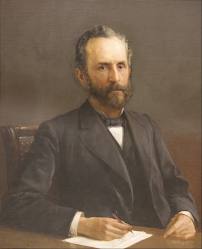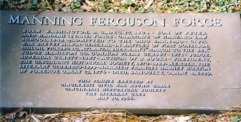 Ohio Patriot, Manning F. Force, was not only a successful Cincinnati, Ohio attorney, but a courageous Unsung Harvard Hero, who would be rewarded for his valor with the Medal of Honor. Force, a stern disciplinarian and task master, expected nothing less than perfection from himself and his troops in the 20th Ohio Volunteer Infantry. These lessons, learned from Force, not only endeared him to his command, but held the men in good stead through some of the most bitter fighting of the Civil War. One of the volunteers of the 20th Ohio describes Force,
Ohio Patriot, Manning F. Force, was not only a successful Cincinnati, Ohio attorney, but a courageous Unsung Harvard Hero, who would be rewarded for his valor with the Medal of Honor. Force, a stern disciplinarian and task master, expected nothing less than perfection from himself and his troops in the 20th Ohio Volunteer Infantry. These lessons, learned from Force, not only endeared him to his command, but held the men in good stead through some of the most bitter fighting of the Civil War. One of the volunteers of the 20th Ohio describes Force,
“A spare grave man with an eye that penetrated to the spine of a culprit, was in the habit of appearing on the drill ground and caused no small discomfort to both drill-master and men by so doing, for he was always critical, and when he spoke he made every one feel that his day of reckoning had come. He took the deepest interest in our welfare, and so was very strict with our follies. We all respected him for his justice and manliness, and before long we had learned to love him like a father.”
 Manning Ferguson Force was born on December 17, 1824, to Peter and Hannah Force in Washington, D.C. where his father was Mayor. Manning developed a childhood interest in history and law which was satisfied by his father’s extensive library. Manning attended Harvard University until 1845 and graduated from Harvard Law School in 1848, receiving an offer to join a law firm in Cincinnati. In 1849 he moved to Ohio, where he would reside for the rest of his life. He was admitted to the Ohio bar in 1850 and formed the law partnership of Walker, Kebler & Force in Cincinnati.
Manning Ferguson Force was born on December 17, 1824, to Peter and Hannah Force in Washington, D.C. where his father was Mayor. Manning developed a childhood interest in history and law which was satisfied by his father’s extensive library. Manning attended Harvard University until 1845 and graduated from Harvard Law School in 1848, receiving an offer to join a law firm in Cincinnati. In 1849 he moved to Ohio, where he would reside for the rest of his life. He was admitted to the Ohio bar in 1850 and formed the law partnership of Walker, Kebler & Force in Cincinnati.
That same year, Manning joined the Literary Club of Cincinnati. This prestigious club of scholarship included as members Salmon P. Chase, John Pope, Thomas Ewing, Jr., Edward F. Noyes, and Rutherford B. Hayes. Manning and Hayes would form a deep, life-long friendship. Hayes and Force formed such a strong bond that several times in his life, when writing to his family, Hayes referred to Force as one of his best and closest friends and remembered in 1891,
“Force is an excellent gentleman, soldier, and scholar who wants nothing for himself nor for anybody else.”
It was through membership in the Literary Club that Manning Force was appointed to the rank of major of the 20th Ohio Volunteer Infantry on August 26, 1861. When the regiment’s commander, Colonel Charles Whittlesey, was assigned to oversee the construction of the defenses of Cincinnati in September 1861, Manning was promoted to lieutenant colonel. He was given the responsibility of training the raw recruits of the 20th Ohio, Force’s strict discipline and diligent care for his soldiers made this contingent one of the hardest-fighting regiments in the Army of the Tennessee.
Force and the 20th Ohio saw their first combat at Fort Donelson in February 1862, where the regiment performed very well under heavy fire. At Shiloh, Force took command of the regiment during the fighting on the second day of the battle. Soon after, Whittlesey resigned and Manning Force was promoted to colonel of the 20th Ohio Infantry on May 1, 1862. Force and his regiment received national attention from their gallant defense of Bolivar, Tennessee, against Forrest’s cavalry on August 30, 1862. The 20th Ohio participated in the advance on Corinth, Grant’s Central Mississippi Campaign, and the Vicksburg Campaign. Force earned special recognition for bravery at the Battle of Raymond and during the siege of Vicksburg. On August 11, 1863, he was promoted to brigadier general and in November, he was transferred to the command of the 1st Brigade stationed at Vicksburg.
In Cincinnati, Ohio, on leave, Force was deeply distressed by the losses on the field of combat and relates in his diary,
“Amid all the luxuries of Cincinnati, and with all the kindnesses lavished upon me, there was a feeling of undefined restlessness, discomfort.”
On June 8, 1864, in the midst of Sherman’s Atlanta Campaign, Force and his brigade spearheaded the 17th Corps advance east of Atlanta and captured an eminence known as Bald Hill, on July 21, 1864. On July 22, 1864, Force led his brigade in a desperate defense of his critical position on Bald Hill. Almost enshrouded in musket smoke, he called for a flag. A junior officer, believing Force meant to surrender, ran off and returned with a piece of white cloth. The incensed commander yelled,
“Damn you, sir! I don’t want a flag of truce; I want the American flag!”
Someone finally brought the Stars and Stripes and Force stood proudly and planted its staff firmly at the summit for everyone to see. While standing on the front line at the top of the hill, a minie bullet smashed into his face below the left eye, shattered his palate, passed behind his right eye, and exited from the upper right side of his skull. His wound at first was believed to be mortal, and so Manning was sent home to die. However, Force miraculously survived his wound, though he was scarred for life.
Force returned to active duty in early October 1864, rejoining Sherman’s army just in time to lead his 1st Brigade through Georgia in the March to the Sea. His wound still bothered him, with waves of pain sometimes sweeping over his jaw.
 Force remained with Sherman’s army until the end of the war and led his men in triumph at the Grand Review in Washington, D.C., on May 24, 1865. He then spent six months at the head of Union Reconstruction forces, mostly in Vicksburg, before receiving his discharge in January 1866. Although offered the rank of colonel in the regular army, he declined and returned home to Cincinnati, Ohio to continue his law practice.
Force remained with Sherman’s army until the end of the war and led his men in triumph at the Grand Review in Washington, D.C., on May 24, 1865. He then spent six months at the head of Union Reconstruction forces, mostly in Vicksburg, before receiving his discharge in January 1866. Although offered the rank of colonel in the regular army, he declined and returned home to Cincinnati, Ohio to continue his law practice.
In 1866, Manning F. Force was elected a county judge in Cincinnati and when Hayes was elected President in 1877 he offered his friend an appointment in the White House. Force rejected the offer and instead was appointed to the Superior Court of Cincinnati, Ohio. He remained on the court until 1888, when poor health, a result of his war wound, led to his resignation.
He spent a brief time recovering at President Hayes’s home in Fremont, Ohio, and then accepted a position as commandant of the Ohio Soldiers’ Home in Sandusky.
On March 31, 1892, nearly 30 years after Bald Hill, Force received the Medal of Honor for his bravery. His citation reads,
“Rank and organization: Brigadier General, U.S. Volunteers. Place and date: At Atlanta, Ga., 22 July 1864. Entered service at: Cincinnati, Ohio. Born: Washington, D.C. 17 December 1824. Date of issue: 31 March 1892. Citation: Charged upon the enemy’s works, and after their capture defended his position against assaults of the enemy until he was severely wounded.”
 Seven years later, Force died at the soldiers’ home on May 8, 1899, at the age of 74. He was buried at Spring Grove Cemetery in Cincinnati, Ohio, where 38 other Union generals and four other Civil War Medal of Honor recipients have been laid to rest.
Seven years later, Force died at the soldiers’ home on May 8, 1899, at the age of 74. He was buried at Spring Grove Cemetery in Cincinnati, Ohio, where 38 other Union generals and four other Civil War Medal of Honor recipients have been laid to rest.
Manning Ferguson Force, an Ohio Patriot, felt a greater duty to his country than to his profession. His courage and valor, is a prime example of the American spirit and that of a true Harvard Hero.
Bummer

